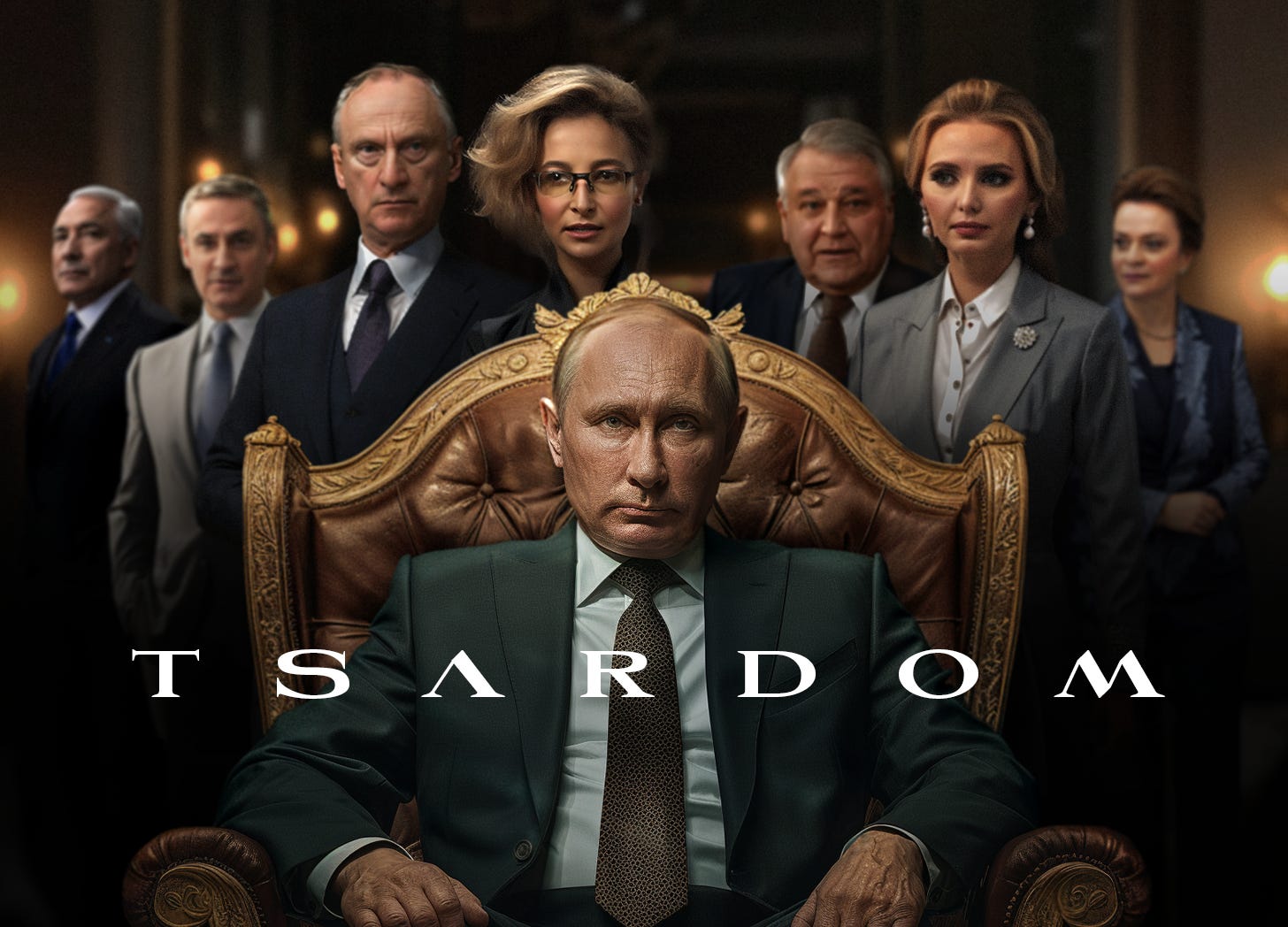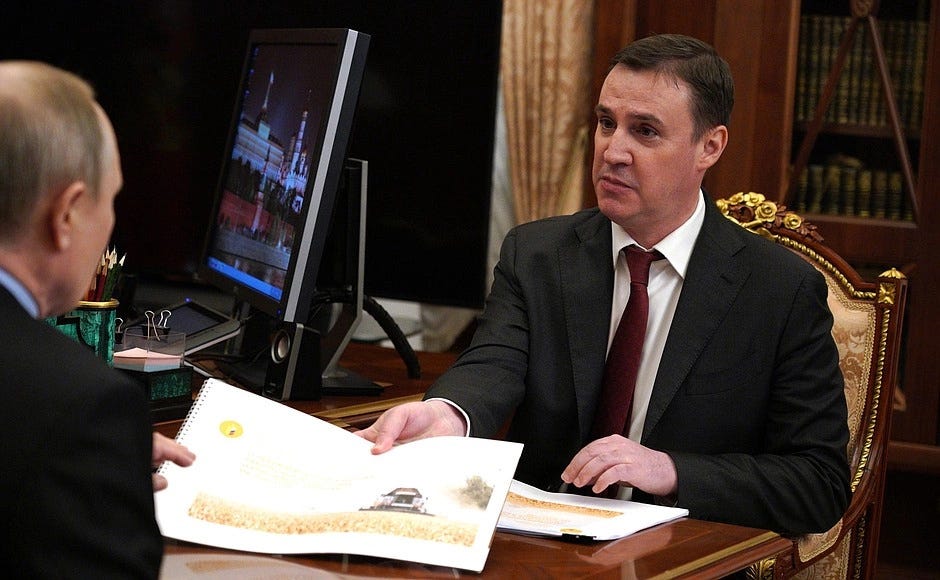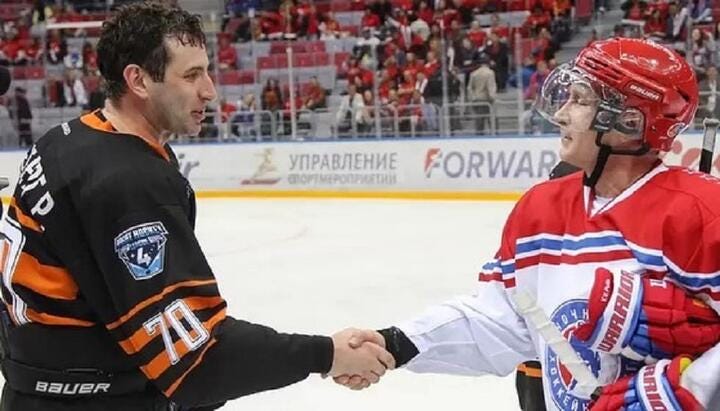I'm launching a series focused on the realities within Vladimir Putin's inner circle. This series will delve into the discussions held in the Kremlin, the beliefs of Russia's top bureaucrats, and the rumors circulating among the Russian elite. Nearly ten years ago, I published my book "All the Kremlin’s Men," which was based on conversations with hundreds of sources and provided an inside look at Putin's close associates. The book remains relevant, although many new developments have occurred over the years.
Over recent decades, Russia has transformed into a caste-like monarchy. Putin's rule is nearly tsar-like, bound by no limits. His circle includes powerful families and clans, as significant as the noble houses during the Romanov Empire. They truly own Russia, having long ago divided among themselves the most crucial governmental positions and corporate entities. In this first episode, I will introduce the so-called "princes"—the children of Putin’s closest friends, who are increasingly stepping into the spotlight.
However, the elite's children have long been ambitious for power. Now, at the beginning of Putin’s fifth term, a unique situation has emerged—they have the potential to occupy the country’s two most significant positions.
Kovalchuk
In the upcoming weeks, a significant ceremonial event is scheduled in Russia. Vladimir Putin will be resting at Valdai, where he will be visited sequentially by the heads of the foremost clans. At the end of the spring holidays, on May 7th, he will officially assume the presidency and after the inauguration will announce his new government. This signifies a reshaping of the power structure, with ordinary bureaucrats anxiously anticipating the outcomes of negotiations between Putin and his boyars.
Yuri Kovalchuk, Putin’s closest friend and indispensable advisor, will visit Valdai to counsel him on appointments. This time, his involvement is central to the intrigue.
Kovalchuk has never held a governmental position; he is simply a businessman who controls almost all of Russia's private media, including the First Channel. Long considered the most powerful Russian oligarch, his influence is bolstered by his association with Sergey Kirienko, the curator of domestic politics in the Kremlin. Kovalchuk and Putin were vacationing together during the 2020 lockdown at Valdai. He is believed to have played a key role in the decision to initiate the full-scale invasion of Ukraine. However, his focus now shifts from geopolitics to the future of his son, Boris.
Boris Kovalchuk, 46, stands out among the influential "prince" generation in Russia. Like Putin, he graduated from the law faculty at Saint Petersburg State University. At just 28 years old, he secured his first significant government appointment as a head of the department.
Since 2009, Boris has served as the CEO of Inter-RAO, Russia's largest state-owned power company. However, at the start of this year, his father decided it was time for a more significant role. In early February, Russian television showed Putin receiving his friend’s son, who reported on his accomplishments. It was obvious that Kovalchuk junior was shamelessly lying—or rather, saying what Putin wanted to hear.
He claimed that Europe had suffered from a lack of electricity the previous year, with prices reaching one thousand euros per megawatt-hour, whereas in Russia, the cost was just 25 euros—a claim far from the truth, as the highest price in Europe did not exceed 300 euros."The results of your work last year are very impressive," praised Putin.
According to sources close to the Kremlin, a discussion between Putin and the elder Kovalchuk preceded this meeting. The elder Kovalchuk had proposed that his son Boris head Gazprom, Russia's largest state corporation. For many years, there have been persistent rumors about the impending retirement of its current leader, Alexey Miller, who has been in office since 2001.
However, Vladimir Putin opted for a different course of action. In mid-March, he appointed the younger Kovalchuk as Deputy Head of the Control Department within the Presidential Administration.
This move is notably unusual. Far from a promotion, it effectively demotes Kovalchuk from leading the largest state corporation to becoming a minor bureaucrat.
Boris Kovalchuk's new role is evidently temporary and, according to insiders, is designed to groom him for the next phase of his career. Intriguingly, this very position was once held by Putin at the start of his political career in Moscow. It is widely believed to be a stepping stone, potentially positioning the younger Kovalchuk to eventually head the Presidential Administration. Putin, who values bureaucratic traditions, believes that before assuming such a significant role, Boris Kovalchuk needs to become familiar with the inner workings of the administration.
Conversations with my contacts in Moscow evoke a narrative from Putin's own past. Reportedly, in 1999, when offered the chance to succeed Boris Yeltsin and lead the country, he initially expressed a preference for leading Gazprom instead.
Patrushev
Another official playing a key role in the Russian power structure is Nikolai Patrushev, the former director of the FSB and now the Secretary of the Security Council. He is regarded as the overseer of the Russian intelligence services.
It was Patrushev, for example, who first voiced the official response following a recent terrorist attack on a concert hall in Moscow, blaming Ukraine for the incident. Despite all Western intelligence being confident that ISIS militants were behind the Moscow attack, the official stance maintained by Moscow remains as stated by Patrushev. He continues to assert, “The trail of this [attack] leads to the Ukrainian intelligence services. It is well-known that the Kyiv regime is fully controlled by the USA. It is also important to consider that ISIS, Al-Qaeda, and other terrorist organizations were created by Washington."
Patrushev is the unofficial strategist behind Russia's foreign policy: he regularly publishes articles in the Russian press about the global political landscape. His latest piece, published in the "Razvedchik" magazine last October, can be considered a manifesto of modern Russian anti-Americanism. Titled "The Collapse of Parasitic Empires," it argues that Russia should lead the Global South's fight against US colonialism.
However, the upcoming meeting between Patrushev and Putin is not about battling America, but about the fate of his son, Dmitry.
Dmitry Patrushev is 46, just like Boris Kovalchuk. He holds the highest position among the "princes" generation. Like his father, he graduated from the FSB Academy. By the age of 29, he was already a senior vice president at one of Russia's largest state-owned banks, VTB. He later headed another bank, Rosselkhozbank, and has been the Minister of Agriculture since 2018.
Putin met with him in February—like Kovalchuk junior, Patrushev junior boasted about Russia setting records. He reported that Russia holds the top position globally for grain exports (which is true), and in 2023, exported more than 66 million tons of grain valued at nearly $16.5 billion. However, the U.S. Department of Agriculture's estimates of Russian exports are roughly half that amount. Putin praised the minister.
Patrushev senior is now lobbying for his son to become the Prime Minister. Rumors have long circulated that Dmitry is a serious contender for this position. The most challenging aspect of this appointment is that, constitutionally, the Prime Minister is the second highest official in the state, automatically assuming the presidential seat should anything happen to Putin. Sources believe Putin is not yet ready to declare anyone from the major clans as his official successor. However, the parallel rise of the younger Patrushev and Kovalchuk forms an intriguing setup, very much in Putin's style, who enjoys setting up competitions even among his closest friends.
Rotenberg
The practice of appointing the children of close friends to the highest positions seems to be a sacred tradition in Putin’s Russia. Nepotism has never troubled anyone in Moscow. An old Soviet joke captures this ethos well: "Can a colonel’s son become a general? The correct answer is no, because the general has sons too."
Putin and his friends are products of the Soviet system. Although Soviet party officials generally hesitated to overtly promote their children, today’s bureaucrats exhibit no such restraint. The sons of Kovalchuk and Patrushev are among the highest-ranking “princes,” with dozens, if not hundreds, of offspring from Putin's top officials occupying other important positions in business or government. I will return to them in future episodes.
However, there is another prominent family clan that vividly demonstrates the lack of boundaries for nepo-babies in Russia—the Rotenbergs.
Arkadiy Rotenberg, one of Putin’s closest friends, will also visit him at Valdai to provide valuable advice on forming the new power structure. Like Kovalchuk, he holds no government positions but is one of the largest state contractors in construction. His company built the bridge connecting Crimea with Russia (which was blown up last year), and he is also responsible for many construction projects in the occupied territories.
Arkadiy Rotenberg and his brother Boris have been friends with Putin since their childhood; they practiced judo together as teenagers. Their strength lies precisely in this lifelong connection. The Rotenberg children have not yet declared any political ambitions, and none of them are vying for a government position. However, Arkadiy Rotenberg’s nephew, Roman, has made his mark in a different field—he is passionate about hockey.
Roman Rotenberg, aged 43, spent his childhood in Finland and then in England, but returned to Russia after the family friend Vladimir Putin came to power. At the age of 30, he was appointed vice-president of the SKA hockey club, and three years later, he became the vice-president of the Russian Ice Hockey Federation.
It was clear to all hockey players that Roman was more a wealthy fan than a specialist. In 2018, following one of the matches, he criticized the performance of coach Oleg Znarok, who had recently led the Russian team to an Olympic gold medal. The coach immediately responded so everyone around could hear: "Who are you, son of a bitch? Fuck off, puppy! Are you going to teach me to play hockey?" He was promptly fired.
In 2022, Roman Rotenberg appointed himself as the head coach of SKA, and later also made himself the head coach of the national team. Sports journalists were shocked, as he had no coaching experience. However, this is not discussed publicly: television commentators have to praise his work. And since Russia is banned from international competitions like the Olympics, he doesn’t even have the chance to truly embarrass himself.
The case of Rotenberg is very symbolic—there are no barriers for the "princes" in Putin's Russia.
However, not all of Russia's most influential individuals are prepared to hand over their responsibilities to their children—many are still actively fighting to maintain their own power.
I will discuss other participants of Putin's Valdai meetings and how the Russian president elevates his own relatives in upcoming episodes.







